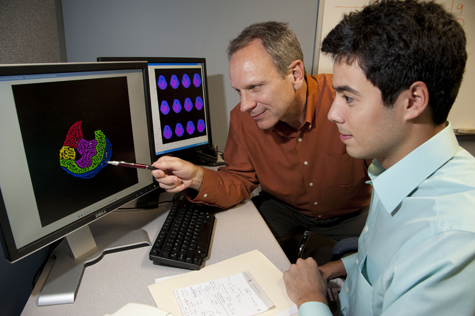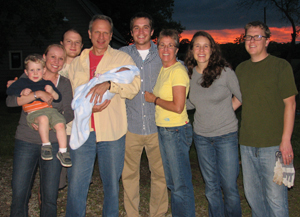
says Susan Deusinger, PhD, executive director of the Program in Physical
Therapy. “His research outcomes have had positive impact on patients
and clinicians; his students continually cite the effectiveness of his
teaching and mentoring in promoting high levels of personal and
professional growth; and his leadership in the professional and
scientific communities is recognized as having a perfect blend of
intellectual and humanistic qualities.” (Credit: Robert Boston)
“Honey” is more than a term of endearment in Michael Mueller’s household. As beekeepers, he and his wife, Monica, harvest about 40 pounds of the sweet stuff every year from their Promised Land colony in their Kirkwood, Mo., backyard.
“I was always interested in bees, and when my kids were young, we went to see a beekeeper,” Mueller says. “I didn’t think you could keep bees in the city, but one night my wife and I were walking, and we saw a guy with a colony about four feet from the sidewalk.”
Mueller struck up a conversation with the man, got involved with the Eastern Missouri Beekeepers Association and started with two hives. He developed a survey for the group and found that while the average yield is 30 pounds of honey per hive per year, one hive can produce as much as 150 pounds of honey.
Keeping bees fits with Mueller’s love of the outdoors. He’s a former marathoner — he ran his last one with his daughter after she graduated from high school in 2003 and still runs for the health benefits. Family vacations usually involve fly-fishing in a remote area.
Finding his niche
A native of Affton, Mo., Mueller, PhD, professor of physical therapy and of radiology at Washington University School of Medicine in St. Louis, attended Lutheran High School South, where he played tennis and basketball. He went to Vanderbilt University, but was undecided on a major.
“I was considering medicine, but it didn’t feel quite right,” he says. “I was more interested in biomechanics — the way the body adapts to different kinds of physical activity — so that was a bigger draw for me than the medical aspects.”
He spent summers working with children with disabilities for Easter Seals in St. Louis, and that offered some clarity about his career path.
“I really enjoyed helping people with physical disabilities, and I think that’s what got me hooked into physical therapy, ” he says.
He looked for a physical therapy program that would accept the credits he had earned at Vanderbilt. Washington University fit the bill, so he came back to St. Louis and enrolled.
Mueller graduated in 1979 with a bachelor’s degree in physical therapy. He completed his clinical studies at what was then the Central Wisconsin Colony, a residential facility for children with profound intellectual disabilities. It was there where he met his wife, Monica, who was working as an occupational therapist.
After finishing his studies, he worked in Milwaukee in long-term rehabilitation, treating people with leg amputations.
“I was really drawn to people with amputations because you could make such an impact on them,” he says. “They lost a leg, but you can give them a prosthetic device and help them walk again.”
After a few years, his interests focused further. Mueller said he felt if he could figure out how to prevent amputation in the first place, then he would really have something to offer patients. So he decided to pursue more education at night while working during the day.
“Again, I looked all over — and by this time we had a baby — and my mom said, ‘You know, Wash U. has this new program, a master’s of health science in physical therapy,’ and we came back here,” he says.
That was 1981, and he has been at WUSTL ever since.
Returning to WUSTL
Mueller started as senior staff therapist at WUSTL’s Irene Walter Johnson Rehabilitation Institute (IWJ). Shortly after, Steven J. Rose, PhD, then director of the Program in Physical Therapy, took over the academic and clinical programs and combined them.
“It was a wonderful time when both programs were completely integrated,” Mueller says. “A lot of exciting research was going on. There’s still a group of us here from that era.”
Mueller earned a master’s of health sciences and took over as co-director of the IWJ clinic, but came to a crossroads: whether to stay in an administrative position or pursue a doctorate and go fully into research.
“I hadn’t intended to pursue an academic career, but I found myself increasingly interested in research,” he says. “I had done clinical studies as part of my previous position, and after I got my PhD, I didn’t know any better not to pursue (National Institutes of Health) RO1 funding right away.
“Back then, there wasn’t the same kind of competition there is now, and my first several RO1 grants were funded on the first submission,” he says.
Mueller’s doctorate is in movement science, an interdisciplinary program looking at human movement in three core areas: biocontrol, which encompasses the neurology aspects of movement; biomechanics, which is the musculoskeletal aspects; and bioenergetics, or the physiology of movement. He now teaches portions of the biomechanics curriculum and a seminar course for doctoral students.
“We study how people move, how different kinds of diseases and injury affect movement, and what we can do to improve movement and performance,” he says.
Over the past 25 years, Mueller’s research team’s focus has been preventing amputations in people with diabetes and peripheral neuropathy who are unable to feel pain and pressure. If they get a blister on their foot, they don’t feel pain, so they keep walking, putting physical stress on an already-injured foot. The wound can become infected and lead to bone infection and amputation.
“We’ve looked at factors that contribute to skin breakdown and devise strategies to prevent that,” he says.
As one example of his research, many people with diabetes develop limited joint mobility, especially at the ankle, and can’t bend their feet as well as non-diabetics. This leads to more pressure on the ball of the foot and more skin breakdown. Working with Jeff Johnson, MD, professor of orthopedic surgery, he devised a clinical trial to lengthen the Achilles tendon to increase the range of motion.

“It’s usually a 10-minute outpatient procedure,” Mueller says. “Dr. Johnson goes in and makes small slits in the sides of the tendon and pushes the foot up,” he says. “When the tendon heals, he or she has much more range of ankle motion, the calf muscle is weaker and the patient doesn’t push off the forefoot as much. We found that patients are less likely to have recurrent skin breakdown after the surgery,” he says.
“Michael Mueller is an extraordinary faculty member,” says Susan Deusinger, PhD, executive director of the Program in Physical Therapy.
“His research outcomes have had positive impact on patients and clinicians; his students continually cite the effectiveness of his teaching and mentoring in promoting high levels of personal and professional growth; and his leadership in the professional and scientific communities is recognized as having a perfect blend of intellectual and humanistic qualities. His work is simply awesome.”
Something bigger
Mueller considers his faith an important part of his life. He and his wife belong to Greentree Community Church, founded about 15 years ago. Each Sunday, between 400-500 members meet in a middle school in Kirkwood for services.
“The common denominator in all this is being part of something bigger,” he says.
“Being a part of Washington University is wonderful because of the opportunity to be around so many talented people in our program and the whole university.
“Then there’s the church family, and that’s connected to something bigger, and then there are the bees — it’s all about being a meaningful part of something bigger than you.”
Fast facts about Michael J. Mueller
Hobby: Fly-fishing
Favorite restaurant: Trattoria Marcella
Latest books read: Letters and Papers from Prison by Dietrich Bonhoeffer and The Memory of Old Jack by Wendell Berry
Favorite place to run: Forest Park